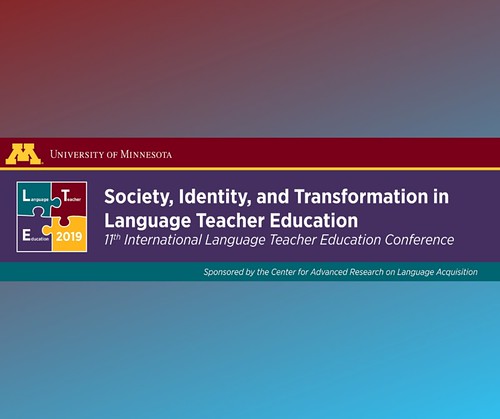2019 CFP: Society, Identity, and Transformation in Language Teacher Education
CFP: Society, Identity, and Transformation in Language Teacher Education
11th International Language Teacher Education Conference
May 30–June 1, 2019
The Graduate Hotel
Minneapolis, MN
Call for Papers Deadline: January 18, 2019

Invited Speakers
Cori Crane, Duke University
Richard Donato, University of Pittsburgh
Maggie Kubanyiova, University of Leeds
Suhanthie Motha, University of Washington
The 11th International Language Teacher Education Conference welcomes proposals for papers and symposia on all aspects of the education and professional development of language teachers including research, theory, and practice related to what and how language teachers learn, the various contexts in which language teacher learning takes place, and the educators who facilitate language teacher learning.
The mission of this unique biennial conference is to address the education of teachers of all languages, at all instructional and institutional levels, and in all the many national and international contexts in which this takes place, including: English as a Second or Foreign Language (ESL/EFL) instruction; foreign/modern/world language teaching; bilingual education; immersion education; indigenous and minority language education; heritage language education; and the teaching of less commonly taught languages. The conference aims to bring together teacher educators from these many contexts to discuss and share research, theory, and best practices and to initiate and sustain meaningful professional dialogue across languages, levels, and settings.
The conference will focus on the following four broad themes:
The Knowledge Base of Language Teacher Education
Social, Cultural, and Political Contexts of Language Teacher Education
Collaborations in Language Teacher Education
Practices of Language Teacher Education
See detailed information about the conference themes at:
carla.umn.edu/conferences/LTE2019/call.html
Types of Sessions
Papers and symposia may report on empirical research, theoretical and conceptual analyses, or practices in language teacher education.
Symposia (2 hours): A symposium provides an opportunity for a group of individuals (typically three to five) to propose a specific issue or topic in the field of language teacher education and examine it from a variety of perspectives. Total presentation time is limited to one hour to ensure that at least half of the session engages presenters and the audience in extended dialogue.
Papers (25 minutes): A paper involves a 25-minute presentation on a topic related to one of the four themes. Papers will be grouped thematically when possible. Grouped paper presentation sessions will include three papers followed by 30 minutes of questions and discussion after all of the papers have been presented.
All proposals must address an audience of language teacher educators and fit within one of the four conference themes listed above.
More Information
Call submission instructions and link to the online submission system: carla.umn.edu/conferences/LTE2019/call.html
Additional information about the conference: carla.umn.edu/conferences/LTE2019/
Conference Sponsors
This conference is sponsored by the Center for Advanced Research on Language Acquisition at the University of Minnesota in partnership with the American Association of University Supervisors and Coordinators; the Center for Educational Resources in Culture, Language, and Literacy at the University of Arizona; and the Center for Urban Language Teaching and Research at Georgia State University. The conference is cosponsored by the following University of Minnesota units: College of Education and Human Development; College of Liberal Arts Language Center; Global Programs and Strategy Alliance; Graduate School; Department of Curriculum and Instruction; Department of French and Italian; Department of German, Nordic, Slavic, and Dutch; Department of Spanish and Portuguese Studies.
All information contained herein courtesy and copyright CARLA at the University of Minnesota.
-

- Log in to post comments




















